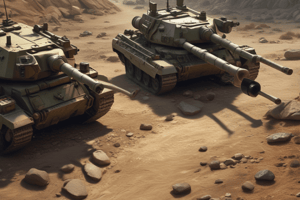Podcast
Questions and Answers
Which principle ensures that the enemy cannot anticipate actions?
Which principle ensures that the enemy cannot anticipate actions?
- Concentration
- Flexibility
- Surprise (correct)
- Economy
How can surprise be achieved according to military tactics?
How can surprise be achieved according to military tactics?
- By repeated attacks on the same target
- Reinforcing established strategies
- Employing temporary positions (correct)
- Using predictable timing
What is the significance of flexibility in military strategy?
What is the significance of flexibility in military strategy?
- It enhances the element of surprise. (correct)
- It limits the use of unexpected tactics.
- It allows for strict adherence to previously planned operations.
- It eliminates the need for reconnaissance.
Which statement reflects the concept of concentration in military strategy?
Which statement reflects the concept of concentration in military strategy?
What is the main purpose of employing surprise in an operation?
What is the main purpose of employing surprise in an operation?
What is a primary focus of fire suppression systems?
What is a primary focus of fire suppression systems?
What is crucial for managing a fire plan effectively?
What is crucial for managing a fire plan effectively?
In fire suppression, what does short crunch refer to?
In fire suppression, what does short crunch refer to?
What situation may require an expanded fire plan?
What situation may require an expanded fire plan?
What role does timing play in fire suppression plans?
What role does timing play in fire suppression plans?
What can be a drawback of suppression systems in certain scenarios?
What can be a drawback of suppression systems in certain scenarios?
How can the intensity of fire suppression efforts be adjusted?
How can the intensity of fire suppression efforts be adjusted?
Why is it important to assist in suppression efforts?
Why is it important to assist in suppression efforts?
Flashcards
Concentration
Concentration
The principle of focusing all effort and resources on a single, decisive point to overwhelm the enemy.
Surprise
Surprise
The element of surprise in warfare is achieved when the enemy does not expect an attack at a specific time or location, preventing them from preparing a defense.
Flexibility
Flexibility
The ability to adapt and change plans during an operation, responding to unforeseen circumstances or enemy actions.
Deception
Deception
Signup and view all the flashcards
Control
Control
Signup and view all the flashcards
Fast fire
Fast fire
Signup and view all the flashcards
Slow fire
Slow fire
Signup and view all the flashcards
Fire suppression
Fire suppression
Signup and view all the flashcards
Controlled fire
Controlled fire
Signup and view all the flashcards
Fire plan
Fire plan
Signup and view all the flashcards
Fire plan adjustments
Fire plan adjustments
Signup and view all the flashcards
Fire situation assessment
Fire situation assessment
Signup and view all the flashcards
Fire containment
Fire containment
Signup and view all the flashcards
Study Notes
Effective Fire
- Fire planning considers weapon capabilities, target threats, and importance of the target
- Fire plans should allocate different weapons for different roles
- Fire can be engaged effectively on the enemy and supported units
- Typical effect duration varies according to the fire type
- Damage calculation should be approximately 50-60%, (30% in practice) with a table (AMTAB) to calculate weapon allocation
- Mortar fire is not suitable for neutralization
- Short bursts of fire are more effective than sustained fire
- Smoke and fire can obscure targets, making neutralization less effective
- Suppressing targets is the main goal of fire
- Harassing fire has lower intensity, designed to demoralize and disrupt the enemy
- Duration of effective fire depends on tactics and factors such as the tactical situation
- Fire can be 'timed' (pre-planned) or 'on call' (as needed)
- Only the person responsible for planning can modify the fire plan
- On-call fire can be used with tactical vehicles
- Quick, accurate attacks in forests and mountains depend on target observation and communication
Principles of Effective Fire
- Concentration is important in terms of rate of fire
- Surprise can be achieved by aiming for surprise attacks
- Flexibility in planning is crucial
- Coordination (co-op) among units is essential
- Economy of effort is needed to maximize the impact of the fire
- In surprise attacks, fire should be focused with suitable duration and volume of fire
- Surprise can be achieved by positioning accurately and choosing specific targets
- Belts of fire and extent are important factors in selecting targets
- Surprise can be achieved with tactical positions and timing
- Planning should include temporary positions, and fire type adjustments
- Maintaining vigilance during fire and corrections is essential for effectiveness
Studying That Suits You
Use AI to generate personalized quizzes and flashcards to suit your learning preferences.




